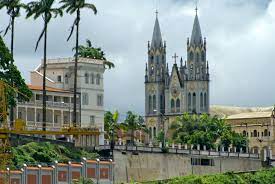Equatorial Guinea
Made of a mainland territory bordered by Cameroon and Gabon and five small islands, the tiny country of Equatorial Guinea is sometimes involved in corruption and dirty money stories. If the heartbreaking vision of extremely poor people struggling for their life in a country which is paradoxically exploiting numerous oil rigs is unfortunately real, Equatorial Guinea also has a much brighter side, as it is an incredibly preserved wildlife haven. Black sand volcanic beaches and untouched lush forests are here home to an astonishing diversity of reptiles and mammals, including many endangered primates such as gorillas, chimpanzees and the colorful mandrills.
HEALTH INFORMATION
We make every effort to ensure that the information posted on our website is up to date and accurate according to the latest public health recommendations; however, it is impossible for us to make changes on a daily basis.
For the most current travel health recommendations, please call our clinic as make an appointment with one of our travel health professionals.
EQUATORIAL GUINEA – RECOMMENDED VACCINES
| Hepatitis A | Recommended for all travelers. |
| Hepatitis B | Recommended for all travelers. |
| Causes, Symptoms & Treatment – Typhoid fever | Recommended for all travelers. |
| Tetanus – Diphteria – Pertussis Vaccine | Tetanus: In exceptional circumstances (eg, stay in a region where access to health care is limited), for a person aged 18 years or older, 1 dose of DT may be given if 5 years or more has elapsed since the last dose. Otherwise, one booster dose at the age of 50*. Pertussis (Whooping Cough): 1 dose is recommended for pregnant women, for every pregnancy, regardless of immunization history and the interval since the last dose (betwen week 26 and 32). *Only applicable for Quebec. |
| Polio | One-time booster recommended for any adult traveler who completed the childhood series but never had polio vaccine as an adult (after 18 years old only). |
| Measles – Rubella – Mumps | Two doses recommended for all travelers born after 1970, if not previously given. |
| Cholera | For humanitarian workers and health care providers. |
| The Yellow Fever Vaccine | A proof of vaccination against yellow fever may be required upon entry in to this country. Some travellers may not be eligible to receive this vaccine. Please enquire with your health care professional regarding your specific details. It is important to note that the vaccine should be administered at least 10 days prior to your departure. For further information, please consult with the World Health Organization (WHO) website: https://www.who.int/ith/ith- |
| Flu – Influenza | Seasonal influenza occurs worldwide. The flu season usually runs from November to April in the northern hemisphere, between April and October in the southern hemisphere and year round in the tropics. Influenza (flu) is caused by a virus spread from person to person through coughing and sneezing or by touching infected surfaces. Everyone 6 months and older should get a flu vaccine yearly. Vaccine is recommended 14 days prior to departure. |
| Routine vaccines (dCaT, Polio, Meningococcal, Shingles, Pneumococcal, Hepatitis B, HPV, MMR & Varicella) | Recommended for all travelers |
| African Tick Bite Fever | Presence. All travellers should protect themselves against tick bites. |
| Transmission, Symptoms and Prevention – Rabies | For travelers at high risk of animal bites or being involved in activities with bats, dogs and other mammals. Clients who plan to visit remote areas may consider receiving this vaccine. Important to note the pre-exposure rabies vaccine is administered in 2 doses with one week interval between doses. Post-exposure vaccination is always recommended, even for those previously vaccinated. |
| Schistosomiasis | Avoid swimming in fresh water. |
| Turista – Traveler’s Diarrhea (ETEC) | Talk to your health care professional about the risks and precautionary measures to take, as well as the Dukoral® vaccine. Important to note that the Dukoral vaccine is an oral vaccine given in 2 doses, recommended at least 2 weeks prior to departure. |
| Malaria | Malaria is present in this country. The risk may be region specific. Prophylaxis measures to be discussed with the health care professional. |
| Dengue Fever, Chikungunya and/or Zika | There are many illnesses that are transmitted via mosquito bites and unfortunately we do not have vaccines to protect us against most of them. It is important to inquire with your healthcare professional regarding the specific risks and the different illnesses presently in circulation. |
RECOMMENDED MEDICATIONS
| Antimalarials Recommended | Malarone, Doxycycline or Mefloquine |
| Acetazolamide/Dexaméthasone | Recommended to prevent Acute mountain sickness (AMS). |
| Antibiotics Traveler’s Diarrhea | Azithromycin or Suprax |
MEDICAL CARE
Equatorial Guinea’s health care infrastructure has seen great improvements these past few years. The country has recently built a well equipped hospital center in Bata. Malabo, the capital city, also has a private clinic with modern medical equipment. But medical care there remains expensive. In public hospitals, corruption, misappropriation of the medical equipment, recruitment of untrained staff, lack of an adequate infrastructure and medicines shortages are common issues. If you intend to travel in Equatorial Guinea, be sure to subscribe a good health insurance that covers repatriation to your country in case of serious sickness or injury.
Ambulance services in the country remain limited.
In Malabo, you will find numerous pharmacies, but the drugs they sell are not of reliable quality. Be aware that many counterfeit medicines are circulating in Equatorial Guinea. Don’t forget to put a complete set of basic medicines in your luggage.
SECURITY ABROAD
Armed robberies, muggings and petty crime occur, particularly in Bata and Malabo. Armed robberies and muggings targeting foreigners have increased in Malabo. Avoid walking alone and walking near nightlife spots after dark. Ensure that your personal belongings, including your passport and other travel documents, are secure at all times.
CANADIAN EMBASSY
Emergency services
In case of emergency, dial:
- police: 113
- firefighters: 115

